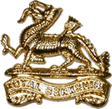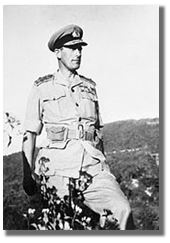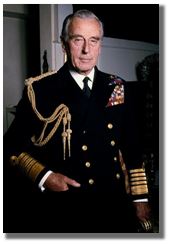A speech by HRH The
Prince of Wales for the 75th anniversary of VJ Day at the National Memorial
Arboretum, Staffordshire
.....Today
we remember and give thanks for the extraordinary bravery, resourcefulness
and tenacity demonstrated by those who fought in the Asia-Pacific Theatre
of the Second World War. Together, they comprised a force whose courage
was as remarkable as its diversity - hundreds of thousands of troops from
India, Burma, China and across Asia, were joined by hundreds of thousands
more from Europe, Africa, Australasia and North America. Together, they
served with the greatest distinction. Without them, the war could not
have been won.
On this day in 1945, the surrender of Imperial Japan and the cessation
of fighting in the Asia-Pacific Region, brought an end to six bitter years
of global conflict. Victory in Europe had been achieved that May, of course,
but while millions in Europe rejoiced, in South East Asia and the Pacific
our long-suffering service personnel, with their Commonwealth and Allied
partners, continued the fight for three more months. It was their extraordinary
endurance and fortitude which secured the end of the War, and which was
later confirmed by the ratification of the Japanese surrender on 2nd September
1945, in Tokyo Bay, on board the U.S.S. Missouri, an event my father witnessed
whilst serving with the British Pacific Fleet.
From the vantage point of the twenty-first century, it is hard for us
to appreciate fully the suffering endured by those who fought, or were
caught up in, this theatre of war. Drawing on his time as Supreme Allied
Commander South East Asia Command my great uncle, Lord Mountbatten, helped
me begin to understand the quite atrocious conditions experienced by our
forces throughout South East Asia. But those of us not there at the time
really can only begin to understand… Lord Mountbatten told me about
his experiences of that gruelling campaign in which our troops not only
faced a determined opponent, but at the same time had to contend with
an incredibly hostile jungle environment and the ever-present scourge
of disease which claimed nearly a quarter of a million Allied casualties.
At this point we should also reflect on those unfortunate prisoners of
war, who suffered so dreadfully. Over a quarter of all Allied Prisoners
of War lost their lives in captivity.
The courage and fortitude shown by all those who fought in the region
was exemplary. Field Marshal Slim observed that victory was reliant “…upon
their courage, their hardihood, their refusal to be beaten either by the
cruel hazards of Nature or by the fierce strength of their human adversary”.
No fewer than twenty-nine Victoria Crosses were awarded during the Burma
Campaign – the highest tally of any theatre of war; another measure
of its exceptional nature. It is also of the greatest importance to remember
the courage of the many ethnic groups in Burma who fought so bravely in
the most appalling circumstances. Their resolve, like that of all British,
Commonwealth and Allied Forces, was unbreakable and, to this day, stands
as an example to us all.
Of course, this was a war that affected not only those who fought, but
had a devastating impact on the countless civilians who found themselves
caught up in the conflict. Indeed, for many in Burma – those who
lived through the war, as well as for their children, grandchildren and
great grandchildren - conflict, tragically, continues to blight their
lives to this day.
And so, as we gather in this most fitting of settings in front of the
Burma Star Memorial Grove, it seems to me to be vital that we remember
all those who were so profoundly affected by this conflict: those who
so gallantly served, a number of whom we are fortunate to have here amongst
us; and those who gave and endured so much, in so many other ways. To
all of you, we owe the greatest debt of gratitude, which can never be
fully repaid.
Having such vivid and special memories of attending one of the many Burma
Star Association Reunions with my Great Uncle, Lord Mountbatten, and meeting
some of the thousands of veterans still alive over forty years ago, I
felt most privileged to have been asked to take on the Patronage last
year of the Burma Star Memorial Fund which, as of today, fully assumes
the mantle of the Association, of which my father was Patron for over
forty years. The Fund will uphold a lasting memorial to the Veterans of
the Burma Campaign through a Scholarship Programme which fully reflects
the multi-national nature of the Allied force which fought in the Far
East. Scholarships are available to young people from any of the thirty
nations which served on the Allied side in Burma. In doing so, it is hoped
that we will keep alive the indefatigable spirit of those who took part
in the Burma Campaign and, through education, share the most precious
dividends of peace and freedom.
Ladies and Gentlemen, today, seventy-five years after that hard-won victory
over tyranny, I am proud and humbled to be able to join you all in expressing
my profound respect and admiration to the Veterans and survivors of that
interminable and terrible campaign. Above all, however, let us remember
all those who never returned, and would never grow old. We pray that their
stories will be passed on to the generations of today and tomorrow so
that we can learn from their example.
All too often, those who fought in the Far East have been labelled “The
Forgotten Army” in the Forgotten War. Many of the soldiers, nurses
and other personnel felt anger and disappointment at how they were treated
when they finally returned home from a war which, from the public’s
point of view, had ended on the 8th May 1945. Today, in this hallowed
place, and in the presence of all those gathered here, or in their homes,
or wherever they may be, let us affirm that they and the surviving veterans
are not forgotten. Rather, you are respected, thanked and cherished with
all our hearts, and for all time. We salute all those who remain among
us, and offer our most heartfelt and undying gratitude for those who are
gone before. Your service and your sacrifice will echo through the ages.
The partner of Sgt.
Roy Welland, Ruth Smith, whose late husband was a member of the Chindits,
also yours truly, the son of Pte.
Albert Sharman was asked to contribute in telling our histories. Ruth
and I hope we did not only our relatives and friends, but also the regiment
proud.
I am at this moment in time seeking BBC Radio Berkshire's permission to
add our accounts to the Veterans Website Project.


Arakan Front, Burma
February 1944

Admiral of the Fleet
The Right Honourable
The Earl Mountbatten of Burma
1976

